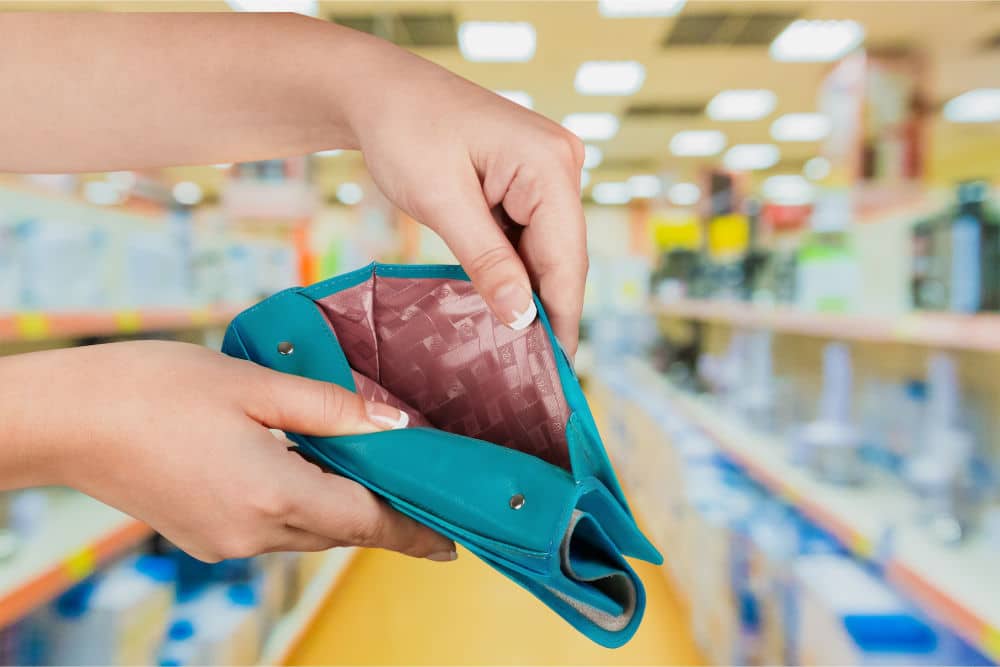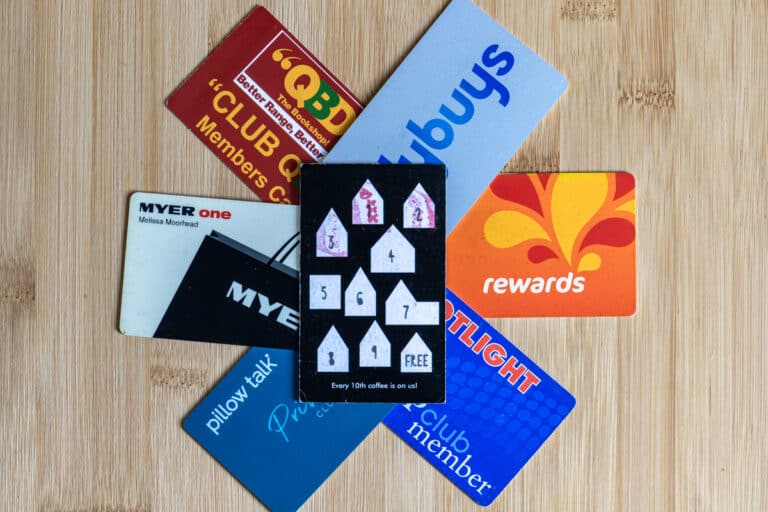6 Commonly Forgotten Budget Items You Need To Save For
This website may earn commissions from purchases made through links in this post.
Unexpected expenses can really blow the budget. Save for these commonly forgotten budget items and avoid being caught short.

It’s easy to forget about infrequent expenses.
Especially when there are all the day-to-day expenses to deal with.
Life is rolling along when along comes an invitation to a birthday party. Or your driver’s licence is due for renewal. Or the dog gets sick.
And these unexpected expenses can blow the budget.
Some unexpected expenses can be covered by the emergency fund. But your emergency fund might not be able to stretch to cover LOTS of unexpected expenses.
So below are 12 commonly forgotten expenses that are worth saving for. By calculating these forgotten budget items upfront, you can rest assured you’ve saved enough to pay for them when they come up.
12 Forgotten Budget Items Worth Savings For
The following expenses are ones that I’ve found – from both my own experience and when talking to friends – to be the most commonly forgotten.
1. Medical and Dental Expenses
It’s only until we get sick, or crack a tooth or need new reading glasses that we wish we’d put money aside for medical bills.
Even if you’re lucky enough to have a doctor who bulk bills, you might still need to buy unexpected medication, be it over-the-counter medication or prescription meds.
During the flu season, medical expenses for a family can really add up! And if you have chronic conditions, then the ongoing medication can be costly. My son has asthma and his puffers are not cheap but they are essential.
If you’re healthy there are still medical costs to consider. The contraceptive pill is one example. The dentist and optometrist are two more. You might also want to invest in preventative medicine like vitamins, massages etc.
If you have Private Health Cover, you may get a discount for paying annually, so it’s a good idea to put aside money each payday to make paying the annual premium easier.
And then there is also the gap to consider. Some funds do not fully cover your expenses or there may be some services that are not fully covered. Can you afford the gap if you go to the doctor or dentist?
When calculating your emergency fund, it’s always important to consider unexpected medical costs. And when doing your weekly budget, don’t forget ongoing medical costs.
2. Car repairs
There are two car repair costs worth budgeting for. The first is unexpected car repairs that happen when things break down. An emergency fund is great for covering these costs.
The second is regular car maintenance costs. Regular costs include servicing but can also include replacing tyres, replacing brake pads and belts etc.
Almost 50% of drivers don’t get their car serviced regularly, the main reason: not enough money because repairs haven’t been budgeted for [source].
The thing is, regular car maintenance can save you money in the long run as well as keep you safe on the road and help avoid preventable breakdowns.
Stash a little cash away each payday for repairs and don’t forget to schedule in a service.
3. Household maintenance
Household maintenance can be another forgotten budget item.
But it’s wise to keep on top of it, otherwise, you’ll end up paying more in the long run. Ignore that leaking toilet and you’ll suddenly have a flood in the living room downstairs (true story).
It’s important to put money aside to maintain your largest financial investment.
4. Education Expenses
Even public education can be really expensive these days.
School fees, uniforms, books and stationery, tablets, laptops, insurance for laptops, excursions, fundraisers…it all adds up.
Ease the burden of back-to-school costs by saving a little each payday throughout the year.
Some schools allow you to set up an account so that you can deposit money each payday into the school account to be used for all of these school expenses. They may also have Centrepay available for those who are eligible for this service and find it helpful.
5. Kids Activities
Kids activities can include:
- Sporting fees and associated equipment and uniform costs.
- Extra-curricular activities
- Music lessons
- Before and after school care and vacation care
- School holiday activities
- Hobby supplies
- Concerts
- Playdates
- Club fees
6. Special Occasions
You may already have a Christmas fund that helps you save for Christmas over the course of a year.
(If you don’t, it can really help take the pressure off Christmas.)
But there are lots of other special occasions that you may need to fit into the budget as well. These may include:
- birthday parties and gifts
- Easter
- farewell gifts (for work colleagues for instance)
- anniversaries
- engagements, weddings, bridal showers
- baby showers
- house warmings
- graduations
It’s not just the cost of gifts to consider. If you’re invited to a wedding, for instance, you may also need to consider formal wear costs, shoes, travel and accommodation.
Of course, being frugal can reduce many of these costs. You can save money by making handmade gifts, for instance.
But having a little money in the kitty to cover these expenses will mean not relying on credit for someone else’s big event.
7. Guests and Entertaining
Having guests over and entertaining is cheaper than going out. But there are still costs of entertaining. If entertaining is important to you, then budgeting for it helps with the costs.
8. Annual Fees
I always forget to save money for our driver’s licences.
So every few years when renewal rolls around, we’re scrambling to find the renewal fee.
Aside from our driver’s licence, it’s amazing how many yearly subscriptions and memberships we have. And I’m not just talking about Netflix or a magazine subscription.
Roadside assist is another really important membership. Anti-virus software. Microsoft Office subscription if you or your kids need to use Excel or Word.
Accountant fees to get your tax done. Legal fees for doing your will.
Sports club fees. Professional memberships. Club memberships. Association fees. Gym fees. Trade journal subscriptions for work. Just to name a few.
It’s amazing how many yearly subscriptions and memberships you can have.
Because some of these expenses only fall once a year (or less) it’s easy to forget about them until the bill arrives.
But if you budget for them now, and put money aside to pay for these fees every payday, it’s a lot easier to pay them when they fall due.
There’s one caveat, however.
Each year, when renewal comes around, rather than automatically renew, consider whether you still need these memberships or subscriptions. Are you getting real value from them? If not, you’ll save by cancelling them.
Getting stuck with unexpected expenses when you haven’t saved for them means one of two options: scrimp and hustle to find the money quickly or rely on debt to get you by.
Save the pain by creating a savings plan and saving them money in advance.
9. Pet expenses
Pets need more than just food and shelter.
Other costs include vet fees, pet registration fees, vaccination fees, flea bath fees, grooming fees, maintenance fees (like aquarium supplies) to name a few.
10. Personal Care and Grooming
This budget item occurs more regularly than some of the others, but when we forget to save for it, it can be a scramble to come up with the funds.
This budget category includes expenses that aren’t part of your regular weekly spending including hair cuts, makeup, shampoo and other hair products, hair removal for instance.
11. Replacement and Upgrade Costs
The average life-span of a laptop is around two to three years. For a desktop computer, it’s up to five years. If you’re lucky.
The lifespan of your average smartphone is two and a half year.
While it’s important both for the budget and the environment to make things last as long as possible and repair rather than replace if you can, eventually our cars, appliances, tech and other household goods wear out and need replacing.
12. Prepping Costs
Here’s a budget item you won’t often come across, but it’s worth considering: expenses for preparing for floods, fires, cyclones, severe storms.
It’s super important households be prepared for emergency situations and extreme weather. Which means ongoing costs to prepare and secure homes, to have back up supplies, recovery costs after an emergency has passed and to give financial support to the amazing volunteer services that protect our communities.
Experts are warning that extreme weather events are only going to get worse. It’s important to plan and budget for preparedness.
For more information, check out the article Emergency Preparedness on a Budget.
How to Save for Forgotten Expenses
When money is super tight, it can be really hard / practically impossible to save for all of these costs.
But even savings just a little bit can help ease the spending pain of future expenses.
And of course, reducing the expenses as much as possible also helps.
The next step after identifying your expenses is to create a budget and pay yourself first. Here are some more articles on Frugal and Thriving that cover these topics:
- How to Create a Super Simple Budget That Works
- How to Pay Yourself First
- Saving for the Bills
- 6 Steps to Building an Emergency Fund
The more you prepare for the unexpected, the easier it is to deal with when it arrives. It’s not easy saving money on a tight budget. But even a little bit can help.








Talking about unexpected costs My husband just broke his key to the car . Just the rubber bit where you put the key ring. We have a 2001 Mitsubishi Lancer replacement cost for key is $380.00!!!!!!!!!!!!
It has electronics in it. now that was a nasty surprise. Luckily I don’t drive much I usually use my key to open the boot and put the shopping in – so I gave him mine and will keep the broken one safe in my handbag for when I want it. This is an important thing to keep in mind and maybe check the key replacement cost for your cars. In the good OLD days a trip to the locksmith and voila ! key cut on the spot for a couple of dollars. Oh well just showing my age Ha Ha
Oh my! That’s an expensive key! As everything gets more complicated, it get’s more expensive as well!